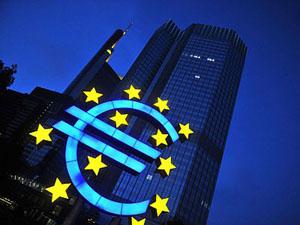European Central Bank officials express support for euro; decline to back words with action
European Central Bank officials met Thursday in Frankfurt to once again discuss potential solutions to the ongoing eurozone crisis.
At a news conference after the meeting, bank chief Mario Draghi reiterated his commitment to the single currency.
“It’s pointless to bet against the euro,” he told the assembled journalists.
Last week, Draghi promised to “do whatever it takes” to save the euro. And, he said, “it will be enough.”
Many were hoping for a big announcement from the ECB on Thursday. But Draghi was long on rhetoric, and short on specifics.
“The euro is irreversible,” he said. “You don’t go back to the lira or to the drachma or to whatever. That’s what it means. So it stays. It stays. It stays.”
Draghi also said the ECB might at some point step in to ease the financial pressure on Spain and Italy.
But Germany, Europe’s economic powerhouse, isn’t crazy about that idea. Such a move, the Germans argue, would take pressure off of Spain, Italy and others to carry out much needed reforms.
It’s a political showdown that has some questioning Germany’s commitment to the euro. Christian Schulz, a senior economist at Berenberg Bank, says that despite some populist rhetoric, most Germans remain committed to Europe.
“For 60 years, European integration has been the foreign policy of Germany, and more than that, it has really been what the population accepts as the successful anchor of Germany in Europe,” Schulz said.
Ending the single currency would, Schulz said, “leave a big void in German foreign policy.” Especially, Schulz pointed out, given Germany’s history in Europe over the past century.
But Schulz says “the pot is now boiling over.”
European officials are under not just internal pressure to fix the crisis, but are also feeling the heat from the International Monetary Fund and the United States as well.
This week, U.S. Treasury Secretary Timothy Geithner was in Europe to urge action. Speaking to Bloomberg News after his return to the U.S., Geithner pointed out that Europe is about one-third of the global economy.
“We all, have a strategic interest in Europe being stronger and not weakened by a long, tragic crisis,” he said.
The situation in Europe is worrying many American politicians, especially those facing voters at the polls later this year.
“It’s hurting the U.S. economy. That’s what they care about. They’ve got an election in three months,” said Mark Weisbrot, co-director of The Center for Economic and Policy Research in Washington.
Weisbrot says the entire euro crisis has been mislabeled. It’s not a debt crisis, or an economic crisis, he says, but a political one.
Leaders in the eurozone’s strong economies, he says, are using the ongoing crisis to push through unpopular reforms in peripheral countries such as Greece, Spain and Italy.
Meanwhile, Weisbrot says, the European economy is tanking and taking the rest of the world down with it.
“The world economy is projected to grow 3.5 percent this year, as opposed to 5.3 percent,” Weisbrot said. “That’s more than a trillion dollars in lost income, and tens of millions of jobs.
Some in Europe say that the solution is greater fiscal and political integration. In other words, more Europe and not less.
But Paul Mortimer-Lee of investment bank BNP-Paribas says that’s a long-term project.
Take the U.S Congress as an example. It can’t agree on what it’s budget is going to be for next year even, he said.
“In Europe, we’ve got 17 parliaments. So if one can’t get it’s act together, how difficult is it to get 17 to agree?” Mortimer-Lee said. “Of course, it’s going to take time, and of course it’s unsatisfactory, but there’s no magic wand solution to this.”
In other words, European officials are likely to find the same problems — but with more expensive solutions — waiting for them when they get back from their August vacations.
Every day, reporters and producers at The World are hard at work bringing you human-centered news from across the globe. But we can’t do it without you. We need your support to ensure we can continue this work for another year.
Make a gift today, and you’ll help us unlock a matching gift of $67,000!
